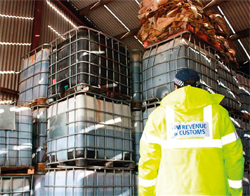 The British-Irish Parliamentary Assembly (BIPA) has labelled the number of border area fuel laundering plants and filling stations selling illicit fuel as ‘alarming’ in a new report.
The British-Irish Parliamentary Assembly (BIPA) has labelled the number of border area fuel laundering plants and filling stations selling illicit fuel as ‘alarming’ in a new report.
The cross-border political body said the practice of smuggling and selling laundered red diesel – which has illegally been treated to have its marker dye removed – by organised criminal gangs in border areas is becoming wider spread, and called for ‘more determined action’ to be taken by authorities. It said a permanent, full-time task force should be set up to tackle cross-border illicit trade, and stricter penalties should be enforced – including lengthier custodial sentences
for offenders.
Other recommendations include updated legislation to ensure operators of filling stations, who are successfully prosecuted for selling laundered fuel, cannot simply reopen again after a few weeks, as happens at present; and the introduction of on-the-spot fines for consumers found to have knowingly purchased illicit fuel.
“Illicit cross-border trade, particularly in fuel and cigarette smuggling, is a huge issue impacting on the lives of citizens and small businesses on both sides of the border,” said the chair of Committee A, senator Paul Coghlan.
The recommendations were welcomed by the Freight Transport Association (FTA). Seamus Leheny, FTA’s policy & membership relations manager for Northern Ireland, said: “Every effort must be made to prosecute the owners of these fuel laundering sites who supply a minority of commercial goods vehicle operators in Northern Ireland, enabling them to use this saving to undercut the overwhelmingly compliant and legitimate operators in the region.”
FTA said it supported any joint enforcement by the authorities on either side of the border, and suggested additional means of prosecution should also be considered against fuel launderers or the owners of sites where this activity occurs – such as environmental legislation enforced by the Northern Ireland Environment Agency.
It added the authorities must also pursue the consumers of laundered fuel, which would reduce demand for it and deprive the fuel launderers of their target market. In November, the HM Revenue and Customs (HMRC) said a new diesel marker would be introduced in the UK and Ireland during 2015. BIPA said it hoped the new marker will “deliver its aim of seriously curbing the incidence of diesel laundering”.




